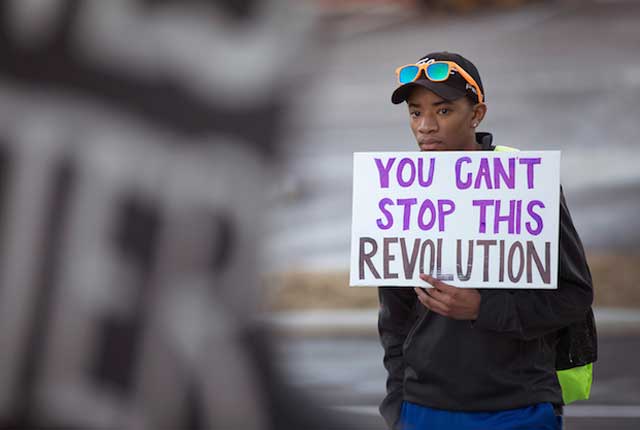After a St. Louis grand jury declined to indict white former Ferguson police officer Darren Wilson, many looked to Eric Holder’s Justice Department for redress. But, as The New York Times reported on Wednesday, it’s unlikely that the Department of Justice will recommend federal civil rights charges against the man who killed unarmed black 18-year-old Mike Brown. Until the decision is official, Brown’s family attorney is withholding comment. But civil rights charges were just one avenue for justice in Ferguson. Almost immediately following the first confrontations on West Florissant, many pointed to underlying conditions fueling residents’ anger. Below, a status update on issues that could bring tangible change in Ferguson and the rest of St. Louis.
Black Town, White Leaders
Ferguson is nearly 70 percent black. Its police department is mostly white as are five of its six city council members. One corrective: voting. As of this week’s filing deadline, eight candidates have stepped forward for three city council seats up for election this April. Several are black including Adrienne Hawkins, a member of a new community group One Ferguson who told KSDK News that the Mike Brown protests inspired her to step up. The Associated Press noted that of the eight, three declared their candidacies just hours before this week’s deadline.
Predatory Courts
"To understand some of the distrust of police," NPR reported in late August that "in 2013 the municipal court in Ferguson–a city of 21,135 people–issued 32,975 arrest warrants for nonviolent offenses, mostly driving violations." Court fines and fees were the city’s second largest source of revenue. That predatory vise grip over the lives of largely low-income residents was the norm for most municipal courts a public defender report found, and it was not peculiar to Ferguson. Since then, local courts have implemented an amnesty program to give residents an extension on their court appearances and fees. St. Louis Municipal Court has adopted a new rule taking into account people’s ability to pay when handing out fines. And a Missouri Senate committee is discussing legislation that would lower the cap on city revenue coming from traffic violations to 10 percent. Missouri’s attorney general is suing 11 municipalities for collecting above the current 30-percent cap.
Reforming the Ferguson Police Department
The justice department is continuing its "pattern or practice" investigation of the Ferguson police department over allegations of excessive force and discriminatory traffic stops. In the Missouri legislature’s current session a number of bills concern policing. Some proposed reforms: requiring the use of body cameras; tightening the state’s deadly force law and appointing a special prosecutor in police-involved deaths.
Ferguson Commission
The 16-member Commission established by Gov. Jay Nixon in the wake of Brown protests has been meeting with community members. It recommendations are due in September.
